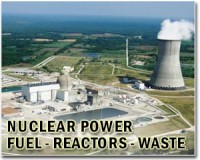 |
Neckarwestheim, Germany (AFP) April 19, 2011 Ever since the Japan nuclear crisis began last month, yellow and red badges saying "Atomkraft? Nein Danke" ("Nuclear Power? No Thanks") with a smiling sun are everywhere in Germany. But anti-nuclear activist Wolfram Scheffbuch has taken to removing his whenever he comes to the small village of Neckarwestheim in the southwest of the country. "It's not the done thing here," the 40-something tells AFP. Neckarwestheim is home not just to one nuclear reactor, but two -- Germany's oldest, in service since 1976, and its newest, up and running since 1989. And villagers are vehemently opposed to shutting them off. Much more than in other European countries, the spewing of radiation by Japan's stricken Fukushima plant since March 11's earthquake and tsunami has shaken to the core Germans' faith in nuclear power. Recent weeks have seen huge protests, culminating on March 26 in a mass demonstration involving a quarter of a million people taking to the streets around the country, according to organisers. The next day, Chancellor Angela Merkel's conservatives were turfed out of power in the southwestern state of Baden-Wuerttemberg, home to Neckarwestheim, after 58 years in charge. The main reason was opposition to nuclear, allowing the ecologist Greens to double their score, not only in Baden-Wuerttemberg, but also in other local elections. Merkel is reconsidering her 2010 move to postpone by more than a decade, until the mid-2030s, the date when Germany goes nuclear-free. The country's seven oldest reactors are switched off pending a safety review. One of those is in Neckarwestheim, and it looks like it might never be turned on again. But the inhabitants of the village are having none of it. Here the Greens fell well short of the 24 percent they scored in Baden-Wuerttemberg as a whole. "They only got 13 percent or so," the mayor of the village for the past 15 years, Mario Duerr, proudly told AFP. And despite the fact that Merkel's Christian Democrats (CDU) scored 49 percent, 10 percentage points more than in the state as a whole, Duerr doesn't like the government's nuclear re-think. "I am not like the chancellor," he says. "I don't change my mind the whole time." Looking around the well-ordered village, with its tennis courts and ultra-modern sports hall under construction, it is easy to see why its inhabitants are no fans of a nuclear-free future. The operator of the nuclear reactors, Energie Baden-Wuerttemberg, better known as EnBW, accounts for 80 percent of the village's corporate tax receipts, and 250 villagers go to work at the plant every day. The local nightclub where Neckarwestheim's youth goes to dance and hang out is called the Uranium Bar. "You have to live well here," the mayor says. Suntanned Elisabeth Rech, who has managed the village's Hotel am Markt for the past 20 years, is rushing off to play golf, but has time to tell AFP that her business would be ruined if the reactors go. "The power station accounts for almost 90 percent of my revenues," she says. "And what would be the point of shutting down our reactors if we end up importing electricity from France?" France, which borders Baden-Wuerttemberg to the west, generates some 80 percent of its electricity using nuclear power. Pensioner Maria Neubauer, tending her garden in full view of the reactors, feels the same. "It's part of everyday life," she says. She's not unhappy about the prospect of the oldest reactor never being switched on again, which seems likely. Because of the radioactivity? "Yes, and also because there is less steam. Sometimes it really ruins the view."
Share This Article With Planet Earth
Related Links Nuclear Power News - Nuclear Science, Nuclear Technology Powering The World in the 21st Century at Energy-Daily.com
 Europe worried but still divided on nuclear energy
Europe worried but still divided on nuclear energyBucharest (AFP) April 18, 2011 Twenty-five years after the Chernobyl disaster, Europe is still divided on the use of nuclear energy. But the Fukushima crisis stirred new fears that could slow down nuclear expansion. "The accident at the Fukushima nuclear plant will upset the development of nuclear power in the coming years", including in Europe, French-based market research company Xerfi Global said in a study published a ... read more |
|
| The content herein, unless otherwise known to be public domain, are Copyright 1995-2010 - SpaceDaily. AFP and UPI Wire Stories are copyright Agence France-Presse and United Press International. ESA Portal Reports are copyright European Space Agency. All NASA sourced material is public domain. Additional copyrights may apply in whole or part to other bona fide parties. Advertising does not imply endorsement,agreement or approval of any opinions, statements or information provided by SpaceDaily on any Web page published or hosted by SpaceDaily. Privacy Statement |